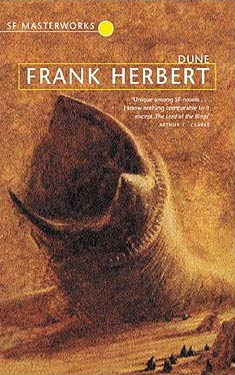Frank Herbert
Completed 4/27/2015, Reviewed 4/29/2015
4 stars
“Dune” is the
greatest space opera I’ve ever read.
That says a lot because space opera is not my favorite genre. Its messages about the environment
and the rise against genocidal oppression really stirs me. Of course, the mystical, prophetic nature of
the plot really tugs at my love for theological SF. But for some reason, I couldn’t completely
put on my golden age of SF blinders and ignore the representation of women and homosexuality,
something I’m usually able to do. So
instead of re-experiencing the profound effect I had when I first read this in
college, I found myself looking at the book as an outsider, only sporadically losing
myself in the otherwise amazing story that “Dune” is.
 What I loved most about “Dune” is the messianic
premise: Paul Atreides, the son of a Duke,
escapes a death plot on their new home planet to be taken in by native Fremen. He and his mother, Jessica, seem to fulfill a
prophesy, with Paul becoming the messianic leader and Jessica the mystic destined
to overthrow the empire and lead the Fremen toward making Dune a “green”
planet. It mixes medieval and Arabic social
structures, Greco-roman oracles, Buddhist principals and Christian messianic
tradition into a complex future of haves and have nots. Then throw in a race of people being
systematically slaughtered by the forces of an evil baron, and you have the
makings of an amazing universe.
What I loved most about “Dune” is the messianic
premise: Paul Atreides, the son of a Duke,
escapes a death plot on their new home planet to be taken in by native Fremen. He and his mother, Jessica, seem to fulfill a
prophesy, with Paul becoming the messianic leader and Jessica the mystic destined
to overthrow the empire and lead the Fremen toward making Dune a “green”
planet. It mixes medieval and Arabic social
structures, Greco-roman oracles, Buddhist principals and Christian messianic
tradition into a complex future of haves and have nots. Then throw in a race of people being
systematically slaughtered by the forces of an evil baron, and you have the
makings of an amazing universe.
My hackles were first raised with the evil baron. Vladimir Harkonnen is the conniver trying to
get tighter with the Emperor. He sets
the ball rolling to destroy the House Atreides.
As it turns out, he’s a pedophile, having a thing for young teen
boys. There are no positive or even
neutral gay characters to offset the perversity of Harkonnen. It’s the old trope of gays in literature:
they are either child molesters or tragically suicidal. It brings me back to my youth, thinking I was
doomed to a miserable life because that was all I read in books or saw in
films. Of course, the argument can be
raised that Harkonnen is not gay, since he shows no interest in adult
males. He pretty explicitly seems to
have lost interest in his heir-apparent nephew as an adult towards the end of
the book. But the equation of gay =
pedophile is already made, and readers like me instantly put up a wall.
The portrayal of women is even worse. They are all basically witches, concubines,
or both. Nearly every female character
is associated with the Bene Gesserit, the order of mystical women who seem to
have a controlling interest in the fate of the human race. It signifies that women only have power through
sex or magic. They have no power in and
of themselves. Whenever two women in the
novel have a conversation, it’s about a man, usually Paul (So, yes, it fails
the Bechdel test). This is par for
golden age science fiction. In a sense,
it’s better than many books which have only one or no female characters. Still, I felt constantly hit over the head
with the concept that the women’s only purpose in life was based on their
relationship to men. Maybe it’s just me,
but I have a hard time believing that 8000 years from now, even if we have an emperor
of the universe, we’d revert back to women being solely tolerated for their
role as lovers, child bearers, and nuns.
Despite these glaring issues, the book remains one of the
greatest science fiction epics I’ve ever read.
I think if the Mythopoeic Award existed at the time, it would have been
another award in its pocket. Herbert
created not just an incredible universe, but one filled with a complete mythology
and history. He had the foresight to write
soft SF, coming up with an anti-computer jihad in the universe’s history, and
not giving details of spacecraft, allowing the book to remain technologically
timeless. I still give “Dune” four stars
out of five, but even allowing it the benefit of the doubt as being the product
of a man born in 1920, it failed to move me in that profound way that a true
timeless classic should have.
I'm in the opposite end of the camp and love space operas, and I think Dune is one of the greatest SF novels...maybe novels period, that I've ever read. I read it for the first time a couple of years ago and couldn't believe how much of it felt relevant to current issues and didn't feel dated. Rare to come by when reading older works of science fiction.
ReplyDelete